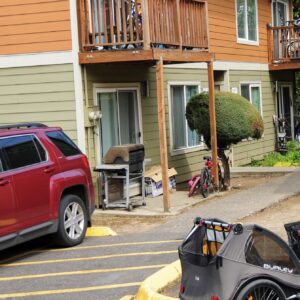
It’s been a few months since BikePortland last checked in with our city’s progress in moving toward its new form of government, so I’ll refresh everyone’s memory with a very short review of where we left off before launching into an update of what’s happening with the transition.
Readers will remember that voters rejected Portland’s “commission” form of government last fall in favor of a system which separates legislative and executive functions.
To achieve closer, fuller representation of constituents, November’s charter reform measure stipulated that the legislative body (the city council) be elected in four geographic districts using a ranked choice voting method to select three councilors within each district, for a total of a twelve-member city council.
The measure not only detailed the new structure of government and voting, it also provided a mandatory set of instructions for transitioning to it. The transition relies on three committees of volunteers with specific tasks and deadlines: the Independent District Commission; the Salary Commission; and the Government Transition Advisory Committee.
All committees have now been seated, and some of their deadlines are not too far away. So let’s look at what they are up to.
The Independent District Commission has been up and running the longest. The 13-member group will have its fifth meeting next week. Its job is to define the boundaries of the four new city council districts — by September. There is a lot of excitement around this.
In order to not run afoul of numerous laws regulating redistricting, including the Voting Rights Act, constitutional rules on race, and equal population requirements, there are several criteria each district must meet. Districts must
- be contiguous and compact
- use existing geographic or political boundaries
- not divide communities of common interest
- be connected by transportation links
- be of equal population
With those requirements in mind, this is the committee that gets to draw the maps. And you can draw along too! Keep your eye open for our related story on the new, improved DistrctR tool, coming up soon.
The Salary Commission is the smallest committee and is made up of five volunteers with human resources expertise. With guidance from Portland’s Bureau of Human Resources, this group’s task is to set the salaries of the twelve councilors, the mayor, and the auditor. This is a change from past practice in which the city council set its own salary. These new salaries will be adopted by August 1st.
This is the only committee made up of experts, and they must set competitive salaries which will attract qualified people—within the guidelines of public employment—while recognizing that many of our future leaders will be relying on that salary to live in Portland. They meet for the third time on April 27.
Their work is an ongoing task which must be periodically reevaluated. A new salary commission will be appointed by the mayor and approved by the city council every two years.
The Government Transition Advisory Committee is the last committee to get up and running, which has caused consternation among charter reform advocates. It’s the committee which advises the city on the whole transition ball-of-wax. Fifteen members were approved by the city council at the end of March, and the group will have its first meeting at the end of April. It does not yet have a web page.
Those are the public-facing, charter reform measure-required, transition committees composed of community members. Obviously, there is also a bit of work going on within the city government, but those internal workings are harder to track.
For example, the Oregonian recently reported that the interim director of the Office of Community & Civic Life, Michael Montoya, has stepped down after two years in the position. Montoya punctuated his departure with a confidential memo to Commissioner-in-charge Dan Ryan which indicated that Civic Life is still in turmoil and detailed a host of bureau problems with overseeing Portland’s neighborhood association structure—including dropped insurance coverage and also possible financial impropriety across multiple district coalitions. Montoya is being replaced by Commissioner Ryan senior aide T.J. McHugh.
Those kinds of rumblings are hard to interpret for any but the most plugged-in city observers, but it leaves the impression that a lot of house-cleaning is still to come. Stay tuned as we keep you informed about this massive shift in how our city is governed.







Thanks for reading.
BikePortland has served this community with independent community journalism since 2005. We rely on subscriptions from readers like you to survive. Your financial support is vital in keeping this valuable resource alive and well.
Please subscribe today to strengthen and expand our work.
This is completely unrelated to the article, but I have to say that the lead photo is an extremely good photo. Should be on the cover of a travel magazine somewhere.
If you are interested in a different take or perspective on the Independent Districting Commission (one not often seen in Portland news media sites or blogs like Bike Portland) take a look at reporter Richard Cheverton’s articles. He can be a bit over the top but does some in depth research on Portland issues.
*** Moderator: deleted link and quote to Cheverton. Agree it is over-the-top, and offensive. Didn’t notice any “in-depth” research. ***
I love the new DistrctR tool, the blocks are very much more detailed, but it would be nice to have a select-by tool that can grab a certain demographic rather than a geographic area.
What kind of demographics are you looking for?
Actually Cheverton on his Portland Dissent substack (along with Bike Portland) are the only local media types that actually listed the names of the members of the unelected commission members. Kudos to both for that. Cheverton did research on their backgrounds and qualifications which can’t be found anywhere else. I like to read a broad range of opinions and information and make my own conclusions.
Cheverton did a half-baked Google search. He’s as much of a journalist as the folks who wheatpaste their paranoid screeds to telephone poles.
You may not like his philosophy but he does have a journalism degree and worked for the Orange County Register for many years. I disagree with him on a number of things especially his writings on COVID.
But he often nails stuff (and sometimes misses) on Portland happenings despite an ornery tone in his writings.
Actually BP posted the list and description of the Independent District Commission on January 13 (10 days before Cherton’s post): https://bikeportland.org/2023/01/20/here-are-the-portlanders-who-will-draw-our-new-council-district-boundaries-369475 . The charter reform measure that was voted upon described how the commission was to be selected by the elected City Council. How would one even vote for a commission?
Correct. That’s why I posted kudos to both BP and Cheverton for writing an article on the members. No one else did.
In Oregon, are candidates legally required to live in the districts for which they are running for office? If so, for how long, and what is the residency requirement?
The charter reform included a residency requirement, where candidates must have lived in their district for at least one year.
I believe that Oregon has the same requirements for the legislature.
Interestingly, it is not a requirement when running for Congress. Representatives must only live in the state, but not necessarily the district.
Out here in NC, every ten years when the districts are re-gerrymandered, there’s always a scramble as incumbent congresspersons move to their next new district. What’s even more interesting is how many of our governors and senators were unsuccessful candidates in other nearby states.
Us Congressional districts are scarce and the census creates a chance every fifth election to need to redraw boundaries based on regional growth (pretty significantly for Oregon in 2022). The residence requirement is the way that it is because the state absolutely can’t disqualify someone from their constituency just by drawing a new map.
So Lisa it seems you are making yourself the arbiter of what is appropriate for bike portland readers to read. I looked at some of his articles,
and while there seemed to be some elements of hyperbole and crankiness there was certainly no hate speech. Why should readers not be able to make an independent decision about what is offensive? Seems like you should leave the link with your opinion on it versus censoring it in the spirit of open access to information.
Lisa, I know I, for one, am capable of deciding what is offensive, to me at least. And these days I find Portlanders in the taste-maker, influencer field have a much broader definition than I do of what is offensive. I don’t like it. Particularly when the people deciding this all seem to be white and educated.
Comment of the week!
It was my call to delete the link, here’s my thinking:
Portland relies on volunteers to step forward and donate their time on many committees. We owe them our gratitude. The work of the government is public, so how people were selected, their names, and the committee work is all available information.
However, the individuals on the committees are usually not public figures and I think we should respect that. I’m particularly sensitive to the fact that, on internet, free speech easily crosses over to weaponized speech and harassment. In this situation, I chose not to amplify content belittling a group of volunteers. The name and the information is still there, it’s just not one-click away. BikePortland is a private business which gets a lot of views, we do not have to amplify everyone with a basement and a blog.
I’ve served on too many advisory committees to count over the decades. As staff and elected officials thank us for our service and/or swear us in, we are always warned that we are serving the public as much as anyone, that we can and often will be scrutinized by a skeptical public and press. I’d say most community members who serve really mean to do their level best to give advice and not seek publicity doing so, but many others are “warm bodies” seeking to pad their resumes or suck up to politicians, while a few use the committees as part of their effort to eventually seek office themselves – they thrive on controversy and notoriety. I myself usually use my time serving on committees to lobby city staff on behalf of the communities I serve, usually for bicyclists who use bicycling for transportation rather than for recreation.
As Arlene Kimura would often say, there’s a lot more to democracy than voting and jury duty – it’s a very messy process.
As far as government funding for nonprofits, it’s a two-way street. For the nonprofit, the added funding allows for operational support they often can’t get from foundations and donations, but usually at a cost of “mission creep” – modifying the core mission to fit the grant criteria – often at a long-term cost of forcing the nonprofit to support the often vague and conflicting views of the government entity. For the government entity, the grants allow government agencies to do stuff through the nonprofit that they cannot legally or politically do themselves, often at a much lower wage and overhead cost, thus giving taxpayers a perceived greater bang for the proverbial buck – but again there are unintended consequences and costs such as overdependency by the nonprofit on government aid, mission creep for both the nonprofit and government agency, and charges of corruption.
As for corruption itself, a good deal of government simply couldn’t operate without it – at no point ever in our history has there been a fully honest and transparent government anywhere – and we as humans keep passing laws that no society has ever been able to fully carry out, often deliberately so.
I see where you are coming from but I don’t think the information shared about the members was meant to belittle them but rather to inform the public about who is implementing the charter. There is very little diversity of thought in the commission. The charter commission was even more of a “group think” entity—the VAST majority there were either nonprofit or government workers. A true “echo chamber”.
I’ve read Cheverton before, and I just took a moment to read some posts again to refresh my impression before commenting here.
His writing is clever and and informative, but also purposely insulting and inflammatory, full of unsubstantiated insinuations of corruption, and generally negative about the state of town while failing to suggest a positive alternative policy.
In short, his writing seems designed to repulse the largest possible constituency for enacting the changes many of us would like to see.
In this town, if you’d like to build a stronger coalition for a more proactive approach to the ills of homelessness, calling homeless people “bums”, “jittery druggies” and “downtown zombies” is a sure fire way to fail. Much like the concerns that far-left internet commentary turns swing voters to the right, Cheverton’s rhetoric is probably pushing local normies away from a coalition to clean the city up.
If you’d like Portland to be cleaner and greener, you should view his writing as a net negative.
He seems like a smart enough guy, and I bet he knows what he’s doing: I just think he doesn’t actually care, and the blog is a fancy way of blowing off steam or maybe a grift.
He brings no more value to this discussion than a bunch of inflammatory, rude, insulting comments would. BP should feel no need to increase his reach.
One thing I’ve been thinking about is how to reform the neighborhood association system in light of the new district representation. I think where I’ve landed is that neighborhood association boundaries should stay the same as now, since people still resonate with those neighborhood identities and districts will have to shift every 10 years. But I think it’s probably time to get rid of the neighborhood coalitions. They were really created as a way to get a facsimile of a “district” where a bunch of neighborhoods band together to advocate to the city. There’s less need for coalitions once we have district representation. The coalitions have also had a lot of drama and scandals over the years, with city funding getting pulled for various reasons, charges that they are acting inappropriately, etc.
I once had to deal with a municipality in Canada (Saanich) that required all land use variances and adjustments to go through local reviews by both a home-owners association and by a renters association. Generally homeowner associations covered a smaller area (there were a lot more of them), but all areas of the community were covered by at least one renter association.